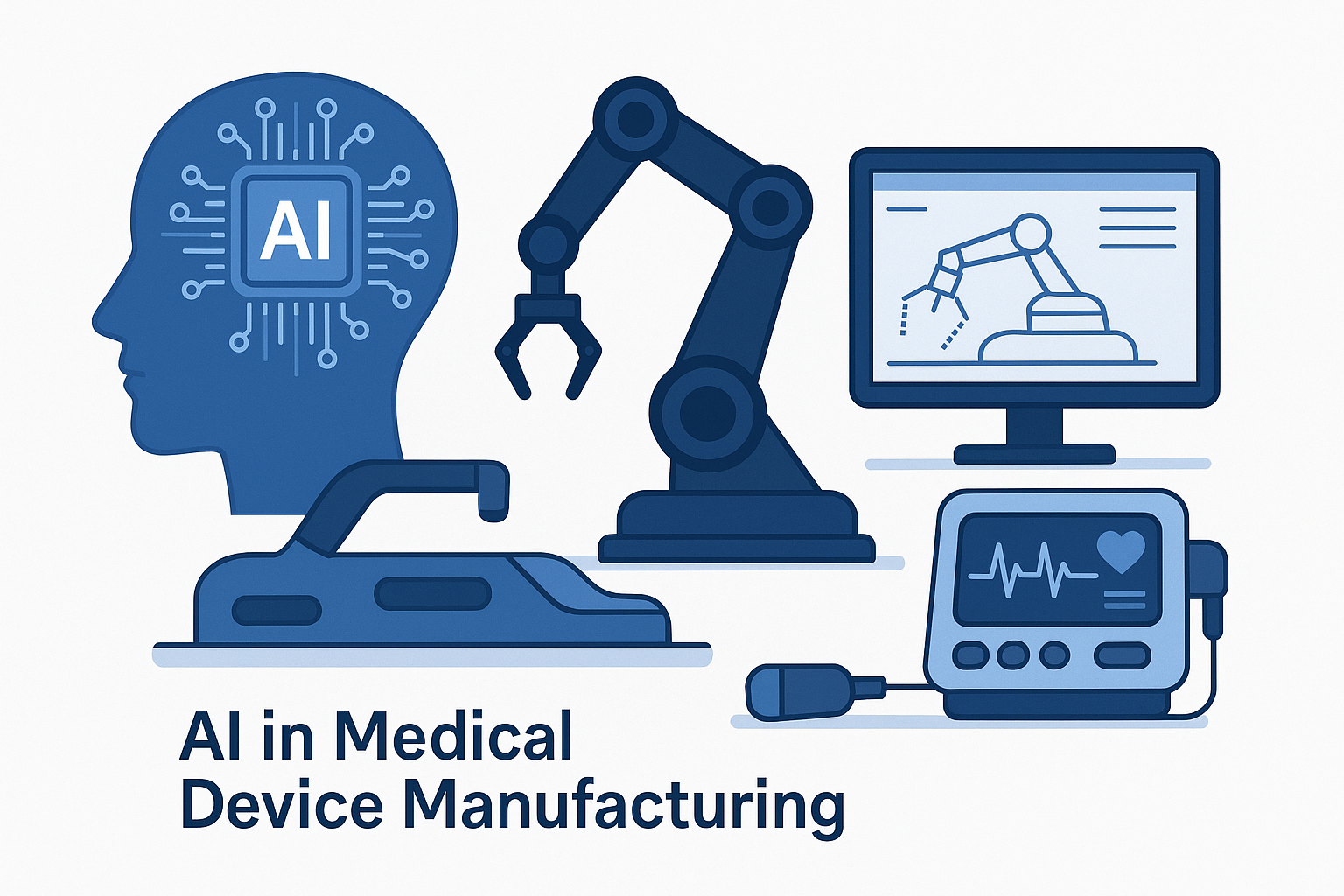Artificial Intelligence (AI) is no longer a futuristic concept confined to science fiction. It is a transformative technology that is reshaping numerous industries—including healthcare. One of the most promising areas where AI is making a profound impact is the medical device manufacturing sector. From design and development to diagnostics and predictive maintenance, AI is streamlining processes, enhancing innovation, and delivering better outcomes for both manufacturers and patients.
In this blog, we examine how AI is transforming the medical device manufacturing landscape and the key areas where it is generating the most value.
Accelerating Product Development
Traditionally, the development of medical devices has been a time-consuming and resource-intensive process involving multiple rounds of prototyping, testing, and regulatory approval. With AI, medical device manufacturers can significantly shorten this timeline.
AI-powered simulations and modeling tools allow engineers to test device designs virtually, reducing the need for physical prototypes. Machine learning (ML) algorithms can analyze massive datasets from past product iterations to suggest optimal design modifications. This accelerates the research and development (R&D) phase while maintaining high safety and compliance standards.
Example: AI-driven computer-aided design (CAD) tools can generate multiple design alternatives for an orthopedic implant, predicting which design will offer the best structural integrity and patient comfort.
Enhancing Quality Control and Defect Detection
AI is proving to be a game-changer in quality control and assurance. Traditional inspection processes can be prone to human error, especially when dealing with minute defects that are hard to detect visually. AI-powered computer vision systems, combined with robotics, can inspect devices with unparalleled precision and consistency.
Using image recognition and deep learning algorithms, these systems can identify defects, such as cracks, misalignments, or anomalies, at an early stage, ensuring only high-quality products move forward in the supply chain. This reduces recall risks and improves patient safety.
Optimizing Manufacturing Processes
AI is helping medical device manufacturers create smarter, more adaptive production environments. With the help of AI-driven analytics, manufacturers can monitor machine performance, predict failures, and optimize workflows in real-time.
This concept, known as predictive maintenance, helps reduce downtime, improve operational efficiency, and lower maintenance costs. AI also enables adaptive manufacturing, where production lines automatically adjust based on changes in device specifications or demand.
Example: An AI system could analyze sensor data from production equipment to predict when a component is likely to fail and schedule maintenance before it causes delays.
Enhancing Regulatory Compliance and Documentation
Compliance with international regulatory standards is a critical challenge for medical device manufacturers. AI simplifies this by automating documentation processes and ensuring that all steps of production, testing, and validation are accurately recorded.
Natural Language Processing (NLP) algorithms can extract relevant data from research papers, technical manuals, and clinical studies to support regulatory submissions. AI can also monitor and update compliance protocols as regulations evolve, helping companies avoid costly penalties or delays.
Improving Supply Chain Management
Efficient supply chain management is vital for the timely production and distribution of medical devices. AI enhances this process by analyzing historical data and predicting future demand, enabling manufacturers to manage inventory more accurately.
AI algorithms can also identify potential supply chain disruptions—such as shortages of raw materials or delays in logistics—and suggest contingency plans. This ensures smoother operations and helps maintain steady product availability in healthcare markets.
Enabling Smart and Connected Devices
One of the most visible impacts of AI is in the creation of smart medical devices. From wearable monitors to connected surgical tools, AI is powering devices that can analyze data in real time and assist in clinical decision-making.
For example, AI-enabled pacemakers can monitor heart rhythms and automatically adjust pacing based on patient activity. Similarly, AI-assisted surgical robots can help surgeons perform complex procedures with greater precision and minimal invasiveness.
These innovations not only improve patient outcomes but also open new avenues for personalized medicine, where treatments and devices are tailored to individual patient needs.
Facilitating Post-Market Surveillance
After a device is launched, continuous monitoring is essential to ensure its safety and effectiveness. AI can analyze real-world data from electronic health records, wearable devices, and patient feedback to detect trends, complications, or adverse events.
This post-market surveillance capability allows manufacturers to proactively address issues and improve future device iterations. It also helps build trust with healthcare providers and regulators by demonstrating a commitment to patient safety and continuous improvement.
Conclusion
Artificial Intelligence is rapidly becoming an indispensable ally for medical device manufacturers. By automating complex tasks, enabling real-time insights, and enhancing product quality, AI is empowering companies to innovate faster, operate smarter, and deliver better healthcare solutions. As AI technology continues to evolve, the medical device manufacturing industry must embrace its potential—not just as a tool for efficiency, but as a strategic driver of future growth and patient-centered innovation. Those who invest in AI today are likely to be the leaders of tomorrow’s healthcare revolution.



